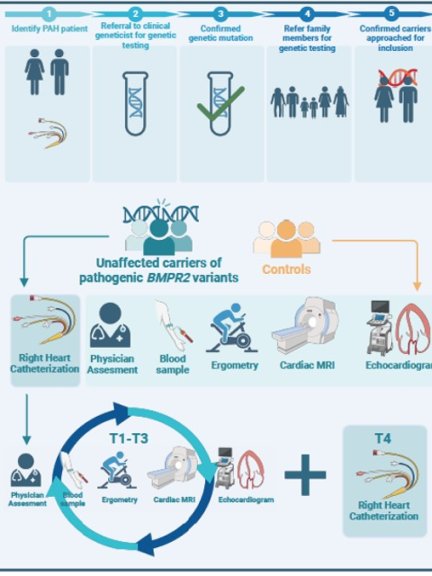Sunday 29 September is World Heart Day, a vital and worldwide initiative dedicated to raising awareness of cardiovascular health. Cardiovascular diseases remain the leading cause of mortality worldwide. A good reason to give extra thought to the importance of research in improving cardiovascular health. That is why we will highlight some of the important research projects from Amsterdam Cardiovascular Sciences (ACS) during this week. Today, we are proud to highlight the second project: the Dolphin project.
Risk factor heritable pulmonary hypertension
The Dolphin study is a cohort study, in collaboration with the Dutch Heart Foundation, that aims to gain more insight on the effects of the pathogenic BMPR2 variant. Some of the people who are carriers of this variant develop pulmonary arterial hypertension (PAH) and others do not (unaffected carriers). However, it is not clear what causes this difference in occurrence of PAH amongst the BMPR2 carriers. To obtain more insights, the cohort study focuses on carriers of BMPR2 who are unaffected by the mutation.

Altered cardiac phenotype
In total, 28 unaffected carriers of BMPR2 and 21 healthy family members without the BMPR2 mutation from 14 families were included in the study. Results revealed that a BMPR2 mutation was associated with an altered cardiac phenotype. Therefore, induced pluripotent stem cell technology is currently used to better understand the role of a BMPR2 mutation on cardiac adaptation to pressure overload and inflammatory response. This is part of the recently funded Vici project of dr. Frances de Man ‘Influence of inflammation on right heart adaptation in pulmonary arterial hypertension’.
Selective new medicines
Recently, a treatment targeting the BMPR2 signaling pathway has been approved by the FDA and EMA. This is a big step for all pulmonary hypertension research. However, more knowledge of this pathway is necessary to predict the long term effects and to develop more selective new treatments. ‘That is why the Dolphin cohort is so unique. Because you are able to get insights in the effects of the mutation in healthy carriers as well as carriers with PAH.’


